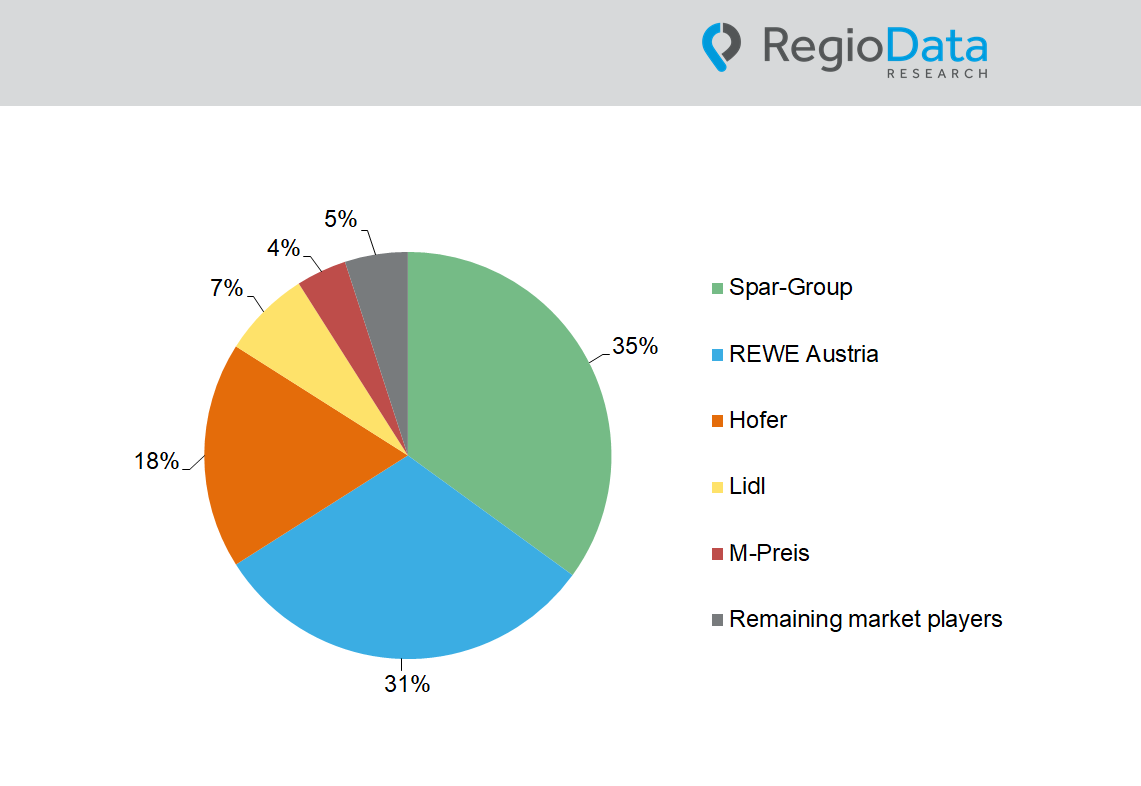Austria
Local supply: Already 580 Municipalities without full-range retailers
The analysis of the RegioData location database shows a long-term deterioration in local food supply in many parts of Austria. Increasingly, small municipalities are no longer fully supplied.
Number of grocery stores in Austria declining
The number of full-range grocery stores in Austria has decreased by a total of 5.1% since 2010. In particular, the “Big 4” – Spar, Rewe, Hofer, and Lidl – which together cover nearly 92% of the Austrian grocery market, have little expansion ambition left. Currently, there are a total of 5,614 full-range grocery store locations, but their distribution varies greatly by region. While the density of retail locations is constantly increasing in large and small urban areas, smaller, unprofitable locations continue to be closed.
A spatial concentration can be observed especially around the major cities of Vienna, Linz, and Graz, as well as in their surrounding communities, the so-called “Speckgürtel” (urban fringe). In contrast, the supply in small, peripheral communities in Upper and Lower Austria is thinning out more and more.
Uneven supply: Large disparities among federal states
Nearly 28% of all municipalities do not have a full-range grocery store. Of these 580 municipalities in Austria, the majority are located in Lower and Upper Austria. Each of these states has approximately 155 municipalities without comprehensive grocery suppliers. Particularly in rural areas with very small settlements, the supply situation is poor. The relatively favorable situation in Styria is mainly due to municipal mergers in recent years, although the supply situation in individual districts remains equally unfavorable.
Not enough potential
In order to operate a grocery store economically, a minimum sales area of 400 m² is typically required. Smaller locations require particularly favorable factors such as high foot traffic, tourists, or special opening hours. To achieve the necessary turnover, the catchment area should have at least approximately 1,500 residents. If this population potential is too low, the operation is not profitable. Existing businesses will eventually close (e.g., due to lack of profitability and inability to find a successor), and new ones will not be established. In some cases, creative approaches like cooperative or community solutions can help, enabling the local population to operate a grocery store themselves without needing to generate profit.
Increasing number of partial-assortment retailers
While traditional grocery stores are declining in some areas, partial-assortment retailers are experiencing growth and are making a significant contribution to improving local supply. The nearly 1,500 convenience stores at gas stations are becoming increasingly popular. However, since gas stations are mostly located outside city centers, they primarily benefit motorized customers. Also on the rise are farm-direct marketers and various vending machine shops. These smaller stores or distribution points, focusing on a very limited range of products, benefit from their flexibility and ability to quickly meet customer needs by selling fresh, local products directly from producers.
An innovative form of local supply, namely self-checkout sales containers, could not establish itself in Austria due to restrictions on opening hours. Despite these containers not requiring staff, they are bound by regular store opening times, unlike vending machine shops, farm-direct marketers, and gas station convenience stores. Austrian pioneers in this field, such as Unimarkt (“UNIbox”) and REWE (“BillaBox”), have therefore closed their locations.
Future
The relatively high number of closures of full-range grocery stores in small villages and neighborhoods in recent years has already significantly decreased. It is expected that only a few new supply gaps will arise in the coming years. Compensating for closures of conventional grocery stores in small communities is challenging, necessitating new approaches and solutions. In this context, two strategies will be particularly important: firstly, automated sales, meaning retail locations without any personnel, and secondly, functional blending, especially between gastronomy and retail, as has been practiced in Italy and Spain for a long time. Both strategies require legislators and stakeholders to promote an improvement in local supply situations through more liberal regulations.
Share post




